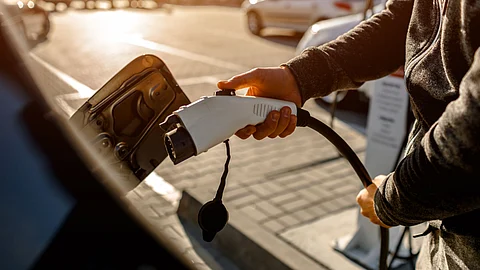
- Home
- About
- Globally Speaking
- Videos
- Podcast
- Geopolitics
- Industry
- SIGN UP

Ambitious government targets and policy incentives have triggered high interest in the sector.
With mobility rapidly evolving as an industry and electric vehicles at the forefront of this change, India is now ripe for EV adoption – with a growing need for mobility options thanks to rising incomes and urbanisation.
More than 300 million vehicles, most of them scooters and three-wheel motorised rickshaws, jam the highways of India – where EVs are still a rarity. But the government is now making an ambitious push for what it calls “electric mobility," to reduce pollution and incentivise an industry that has the potential to radically transform the mobility landscape.
As per government data, the EV passenger car segment has a massive potential though right now it is a niche: in March, 25,640 electric vehicles were sold across the country, of which 90per cent were two and three-wheelers. The total 400,000 EVs registered in India in 2019 accounted for less than 0.2per cent of all vehicles.
The EV market in India has been growing at an annual rate of 20per cent and is dominated by five major players: Tata, Mahindra & Mahindra Ltd., MG Motor India, Olectra Greentech Ltd. and JBM Auto Ltd. Increasingly however, local startups are joining the fray – thanks to government interventions such as raising tariffs on imports of EVs and their parts, including lithium-ion batteries. That and other policies aimed at encouraging domestic production have helped raise the quality and bring prices down to the level of conventional cars in India.
“India has undertaken several initiatives to push for the increased adoption and use of electric vehicles (EVs). For instance, it is a participant country in the EV30@30 Campaign, a Clean Energy Ministerial initiative, which aims for the sales share of EVs to reach 30 percent by 2030,” said Dr. Ramanath Jha, Distinguished Fellow at Observer Research Foundation.
“The campaign supports the market for electric passenger cars, light commercial vans, buses and trucks (including battery-electric, plugin hybrid, and fuel-cell vehicle types) and focuses on the charging infrastructure needed to supply sufficient power to the vehicles deployed. India has a more ambitious EV target — by 2030, it expects 70 percent of all commercial cars, 30 percent of private cars, 40 percent of buses, and 80 percent of two-wheeler and three-wheeler sales to be electric,” he said.
According to Kearney, with Indian and international original equipment manufacturers’ growing interest in EVs and the decreasing cost of batteries and technology, all segments have significant potential for growth.
Manufacturers have also been buoyed by the fact that about half of India’s 31 states have drafted EV incentive policies with varying degrees of progress – from providing a slew of subsidies to first-time EV buyers to exemption from road tax and registration fees, encouraging swapping of old petrol and diesel vehicles for new electric ones.
To put the adoption of EV in top gear, it’s imperative that all levels of government in India – the federal, state and local – and the automobile industry work together with a common and coordinated action towards realising the EV goals.
“Urban local bodies will be critical in the e-mobility transition, and two vital areas will need strengthening – city governance and city finance. The city chief executive must make decisions on ground implementation to avoid the traps of red-tapism. Additionally, given the fragility of municipal finances, the central and state governments must enable adequate financing for EV infrastructure at the local level,” Dr Jha said.
What is really encouraging is that several Indian cities are already preparing for an EV future.
Mumbai is setting up charging stations at strategic locations, including retail malls, business hubs, highways and even residential neighbourhoods. The Delhi government has notified the Delhi EV Policy 2020, to offer subsidies, road tax and registration fee waivers for EVs. In Bengaluru, 112 charging stations have been set up for EVs and to encourage citizens to switch to EVs from fuel-based cars, and similar initiatives have also been adopted in Kolkata. With more incentives and investments, electric mobility is certainly bracing for an exciting future ahead in India.